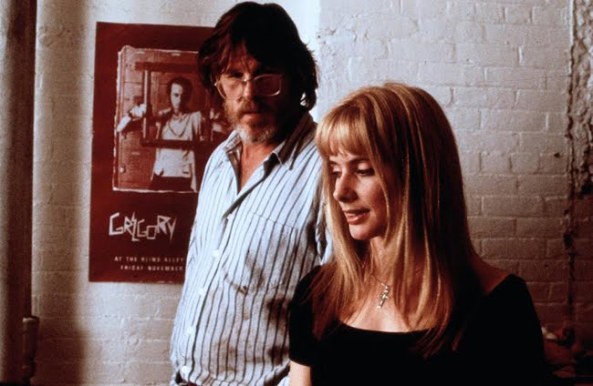After the 1992 Rodney King beating was caught on tape, everyone had questions about the victim we were seeing. “Rampart” looks at the other side of the police brutality video, profiling a bad, racist cop who deserves all the pain that comes to him but recognizes he’s human all the same.
Oren Moverman’s (“The Messenger”) film takes place in 1999 Los Angeles, when the LAPD was notorious for corruption. For Dave Brown (Woody Harrelson), racism is a part of his daily routine. He’s got the mentality that we know to be stereotypical and wrong, and yet he’s been around so much that he displays a logic and understanding that can be hard to fully disagree with.
When a Mexican gangbanger collides with Dave’s cop car, the man shoves his car door into Dave and tries to make his escape, only for Dave to chase him down and beat him senseless. The violence is caught on video, and the DA’s office feels Dave is the perfect scapegoat to throw to the press as they juggle their own corruption allegations.
As he tries to escape his punishment and remain on the police force, “Rampart” follows Dave’s descent to rock bottom. Before long he’s pulled all of his strings with a former colleague (Ned Beatty), his on the street contact (Ben Foster) and the defense attorney who is his current lover (Robin Wright), and he’s got no one left to turn to in support of his reckless ways.
Less of a crime procedural and more of an emotionally poignant character drama, “Rampart’s” effort to make us feel empathy for this evil man is built on the fiery performance by Woody Harrelson. Blackmail, framing, adultery, brutality and racism; this guy does it all, but Harrelson is careful never to let Dave take sadistic pleasure out of all his hatred.
We see him as a nuanced man, powerless amidst his own family. He was married to two sisters (Cynthia Nixon and Anne Heche) and fathered a daughter with each. His oldest, Helen (Brie Larson), is now a man-hating lesbian and holds his dad responsible after Dave earned a reputation as “Date-Rape Dave” for allegedly murdering a man trying to rape a woman. He had his reasons for doing what he did to that guy, and they may have even been noble, but what matters is that his family doesn’t feel the same. You wonder then where Dave’s external hatred comes from.
Moverman shoots from canted angles and behind grated bars and windows to show just how skewed a perception Dave has on life. It gets over-stylized at times, and you beg for the simple gritty realism to be found in his previous film “The Messenger.” That movie contained more raw emotion in one, motionless shot that lasted for nearly nine minutes than “Rampart” does in its portrait of a much more emotionally intense character.
Still, “Rampart” is a powerful film. The movie’s cryptic screenplay and open-ended climax has left many audiences frustrated, but the ending doesn’t matter so much as the hard truth that for even the worst guy in the world, we wouldn’t wish upon him the pain of having nothing left.
3 ½ stars
 If Armando Iannucci’s The Death of Stalin is about Trump’s America in any way, it’s that sheer incompetence looks really funny right up until the point that things get scary quickly. No one is doing better fictional political satire on TV or film than Iannucci. And while Veep nor The Death of Stalin are direct portraits of today’s political climate, they find clever and often profane parallels in unexpected characters and situations.
If Armando Iannucci’s The Death of Stalin is about Trump’s America in any way, it’s that sheer incompetence looks really funny right up until the point that things get scary quickly. No one is doing better fictional political satire on TV or film than Iannucci. And while Veep nor The Death of Stalin are direct portraits of today’s political climate, they find clever and often profane parallels in unexpected characters and situations.

